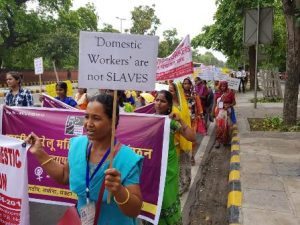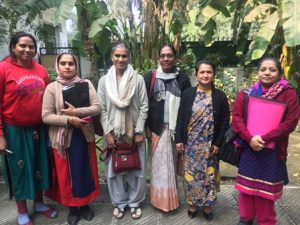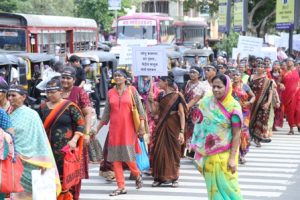Domestic Workers: A Community Disregarded For Too Long
Through suitable amendment in the Minimum Wages Act 1948, the members of the National Domestic Workers Movement demand for bringing domestic workers under the existing labour legislations.

A 12-Year-old girl of Tamil Nadu was employed as a full-time domestic help and was treated inhumanely with no salary given to her at all. She was made to do all the chores and was given only two meals a day in the name of remuneration. She was made to serve drinks in the parties and was sexually exploited by the guests during such parties. Even her employer used to touch her inappropriately in absence of his wife. She somehow managed to escape from that house after three years only to be denied the right to register a case with the police.
“The domestic workers are exploited and are kept in slavery for years. It’s a long fight to protect their rights. We request the government to protect them through legislation and to provide minimum wage and social protection,” says Christin Mary, the National Coordinator of National Domestic Workers Movement (NDWM).
The Movement (which is registered as a Trust) has been working for championing the rights of domestic workers, children in domestic work and migrant domestic workers since 1985. In the early eighties, Sr. Jeanne Devos began working with women and children in the Dindugal district of Tamil Nadu, and encouraged small groups of domestic workers to come together with the objective of supporting themselves and each other. In 1985, she relocated to Mumbai and assisted with setting up some more domestic workers’ groups, which subsequently led to the launch of the NDWM.
Domestic work is defined as “work performed in or for a household or households”, as per ILO Convention 189. According to NSSO (61st Round, 2004-5), there are approximately 4.2 million domestic workers in the country. These numbers have been on the rise since 1999 and have grown by approximately 120 per cent since liberalisation.
In India, 93 per cent of the workforce is in the unorganised sector and hence, is beyond the purview of most labour laws. As domestic workers represent disempowerment, they are not even recognised as workers. India only has three laws that roughly consider maids as workers – the Unorganised Workers’ Social Security Act of 2008, The Sexual Harassment of Women at Workplace (Prevention, Prohibition and Redressal) Act of 2013 and Minimum Wage Act 1948.
“Around half the states have included domestic workers as labourers under the Minimum Wages Act, which lays down the terms of payment, hours of work and leave. However, this law is inadequate.”

NDWM is demanding the Government of India to enact a Comprehensive National Legislation for Domestic Workers, to ratify the ILO Convention 189 and to withdraw the Labour Code.
Workers get exploited by both the employers, and the agencies which help them find employment. The biggest problems they face are the unregulated working conditions, no maternity benefits, wages which are dependent on their negotiating power, and sexual harassment.
Agencies also fail to hold themselves to the ethical standards and find it easy to exploit the already deprived workers. They act as a middle man through which the salary is given to the domestic worker. This however increases the likelihood of exploitation and increased arbitrary commission. They also mislead and fraudulently lead the needy person into exploitative business by trafficking them.
“A comprehensive National Legislation for Domestic Workers is essential due to “unsuitability of existing laws” to protect the specific interests of domestic workers.”
Notably, women make up the majority of domestic workers. Between 2000 and 2010, women accounted for 75 per cent of the increase in the total number of domestic workers in India. Domestic work is also an important source of income for women – as much as 14 per cent of female wage employment in Latin America and 11 per cent in Asia. By all estimates, the sector is poised to grow. According to UN estimates, the proportion of people aged 60 or above will multiply by 1.8 billion by 2050 and by 2.3 billion by 2100, as compared to 2015 (UN DESA, 2015).
Also read: Working women in Kerala need beneficial laws
There was an attempt to bring about a specific legislation meant for domestic workers by the National Commission for Women. This was the Domestic Workers Welfare and Social Security Act, 2010, but the Bill was never passed. The proposed legislation dealt with major issues affecting the domestic workers like social security, minimum wages, national welfare board, bad working conditions, unfulfilled basic needs, housing needs, job security, maternity benefits, sexual harassment, physical and mental violence, false charges of theft, trafficking, etc.
“Despite a number of Private Member Bills in the parliament Government does not pay any attention to the demands for legislation: In 2016, Shashi Tharoor introduced the Domestic Workers’ Welfare Bill, 2016; The Domestic Workers (Regulation of Work and Social Security) Bill, 2017 was tabled by Oscar Fernandes in Rajya Sabha; The Domestic Workers (Regulation of Work and Social Security) Bill, 2017 was tabled by Tripura West MP Sankar Prasad Dattain in the Lok Sabha.”
The Trust has been continuously lobbying with the government with the help of 50,000 domestic workers who are a part of the organisation. They use rallies, demonstrations protests, public hearings, meet up with MPs, social media campaigns, etc. to bring their cause to the notice of the Government. They also conduct training programmes for the domestic workers to create awareness about their rights and to teach them the ways to communicate their grievances to their employers. NDWM files PILs and writ petitions from time to time advocating the cause of the workers but these have been met with nothing more than assurances.
Also read: Who cares for caregivers?
Through suitable amendment in the Minimum Wages Act 1948, the members of the Trust demand for bringing domestic workers under the existing labour legislations such as in Andhra Pradesh, Bihar, Karnataka, Meghalaya, Rajasthan, Kerala and Tamil Nadu.
Around half the states have included domestic workers as labourers under the Act. However, this law is inadequate, they say. The law does not require domestic workers and employers to register with any authority, which is crucial for monitoring whether both parties are fulfilling their contractual obligations and for adjudicating conflicts.
A domestic worker from Delhi, Aarzu Singh, says that the exploitation of the women domestic workers should be stopped and they should be provided with better wages and good working conditions.

They also demand for withdrawal of the Labour Code by the Government because these labour codes negate all what the workers have been struggling for these last one hundred years and on the contrary make things much easier for the employers with the focus on ease of doing business and hence they want these new labour codes to be withdrawn in their present form.
While the Trust calls for ratification of ILO Convention 189 as it recognises the significant contribution of domestic workers to the global economy, the government refuses to ratify the convention on the grounds that it has to be preceded by enactment of a legislation relating to domestic workers.
The Trust has to encounter problems like reluctance on the part of the workers to support the demands put forward by it as they fear losing their jobs. Also, Delhi government has denied registering the union under Trade Union Act 1926 on the grounds that the domestic work does not come under the definition of ‘trade’ as mentioned in the Act, though the Trust has been registered in other states like Tamil Nadu.
“Their aim is not just to bring legislative reforms in the country but to change the attitude and outlook exhibited by the society towards domestic workers in the country.”
Another domestic worker tells Delhi Post that they are addressed as “Bai” or “Kaamwali” and are treated akin to a slave with no dignity. However, she also mentions that this outlook is slowly changing due to the increasing necessity of domestic workers for working urban class. But the dignified status in the society and treatment as equals still remains a far cry or a distant dream for them.
